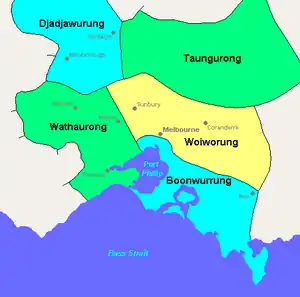Taungurong
The Taungurong people, also known as the Daung Wurrung, were thirteen clans who spoke the Daungwurrung language and were part of the Kulin alliance of indigenous Australians.[1] They lived to the north of, and were closely associated with, the Woiwurrung speaking Wurundjeri people. Their territory was to the north of the Great Dividing Range in the watersheds of the Broken, Delatite, Coliban, Goulburn and Campaspe Rivers. They were also known by white settlers as the Devil's River Tribe or Goulburn River Tribe.[2]

History
The Taungurong people used the King and Howqua River valleys as a major route for trade or war between tribes.[3] The Howqua River valley contains a number of archaeological sites of significance including at least two quarry sites for greenstone, an exceptionally hard rock used for stone axes, spears and other cutting tools which the Taungurong traded with other tribes. There are many other significant cultural both tangible and in tangible across their country.[4]
A raiding party of up to 40 Taungurong is believed to have been killed in May–June 1839 on Dja Dja Wurrung territory at the Campaspe Plains massacre.[5]
In February 1859 some Wurundjeri elders, led by Simon Wonga (aged 35) and brother Tommy Munnering (aged 24) petitioned Protector William Thomas to secure land on behalf of the Taungurong clans for the Kulin at the junction of the Acheron and Goulburn rivers in Taungurong territory. Initial representations to the Victorian Government were positive, however the intervention of the most powerful squatter in Victoria, Hugh Glass, resulted in their removal to a colder site, Mohican Station, which was not suitable for agricultural land and had to be abandoned.[1][6]
In March 1863 after three years of upheaval, the surviving leaders, among them Simon Wonga and William Barak, led forty Wurundjeri, Taungurong (Goulburn River) and Bun warrung people over the Black Spur and squatted on a traditional camping site on Badger Creek near Healesville and requested ownership of the site. This became Coranderrk Station.[6]
The Taungurung Clans Aboriginal Corporation was registered as a Registered Aboriginal Party by the Victorian Aboriginal Heritage Council on 16 July 2009.[7]
Notes
Citations
- Broome 2005, pp. 123–125.
- Presland 1985, pp. 45–46.
- Alpine National Park Management Plan 1992, p. 68.
- Alpine National Park Management Plan 1992, p. 69.
- Attwood 1999, pp. 7–9.
- Ellender & Christiansen 2001, pp. 112–113.
- Department of Premier and Cabinet 2009.
Sources
- "Alpine National Park Management Plan" (PDF). Department of Conservation and Environment. September 1992. Archived from the original (PDF) on 31 March 2012.
- Attwood, Bain (1999). "My Country. A history of the Djadja Wurrung 1837-1864". Monash Publications in History. 25: 7–9. ISSN 0818-0032.
- Barwick, Diane E. (1984). McBryde, Isabel (ed.). "Mapping the past: an atlas of Victorian clans 1835-1904". Aboriginal History. 8 (2): 100–131. JSTOR 24045800.
- Broome, Richard (2005). Aboriginal Victorians: A History Since 1800. Allen & Unwin. pp. 123–125. ISBN 1-74114-569-4.
- Ellender, Isabel; Christiansen, Peter (2001). People of the Merri Merri. The Wurundjeri in Colonial Days. Merri Creek Management Committee. pp. 112–113. ISBN 0-9577728-0-7.
- Presland, Gary (1985). Aboriginal Melbourne: The Lost Land of the Kulin People (Second ed.). Harriland Press. pp. 45–46. ISBN 0-9577004-2-3.
- "Taungurung Clans Aboriginal Corporation". Department of Premier and Cabinet. 16 July 2009. Archived from the original on 14 October 2016. Retrieved 24 May 2016.
